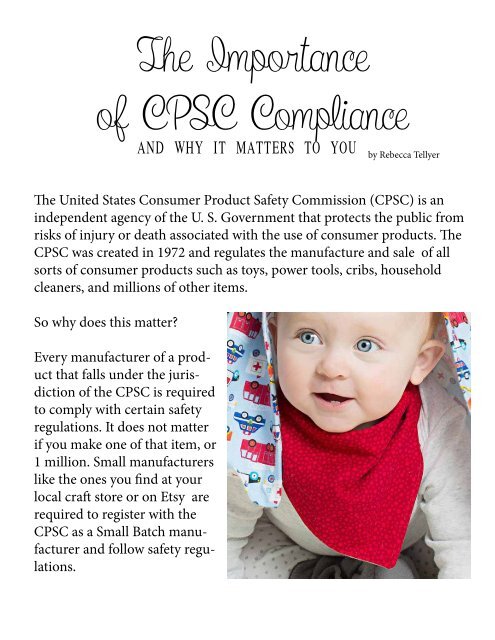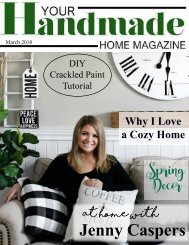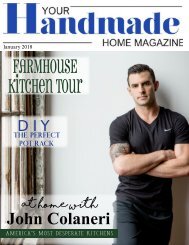Your Handmade Home Magazine November 2017
This months issue is packed full of design ideas and articles, as well as our Holiday Gift Guide!
This months issue is packed full of design ideas and articles, as well as our Holiday Gift Guide!
You also want an ePaper? Increase the reach of your titles
YUMPU automatically turns print PDFs into web optimized ePapers that Google loves.
The Importance<br />
of CPSC Compliance<br />
and why it matters to you<br />
by Rebecca Tellyer<br />
The United States Consumer Product Safety Commission (CPSC) is an<br />
independent agency of the U. S. Government that protects the public from<br />
risks of injury or death associated with the use of consumer products. The<br />
CPSC was created in 1972 and regulates the manufacture and sale of all<br />
sorts of consumer products such as toys, power tools, cribs, household<br />
cleaners, and millions of other items.<br />
So why does this matter?<br />
Every manufacturer of a product<br />
that falls under the jurisdiction<br />
of the CPSC is required<br />
to comply with certain safety<br />
regulations. It does not matter<br />
if you make one of that item, or<br />
1 million. Small manufacturers<br />
like the ones you find at your<br />
local craft store or on Etsy are<br />
required to register with the<br />
CPSC as a Small Batch manufacturer<br />
and follow safety regulations.<br />
Imagine how important this is to parents who are purchasing items for<br />
their children. Take, for example, a parent who purchases some bibs for<br />
their child. It’s just a bib. Or is it? According to the CPSC, a bib is categorized<br />
as children’s clothing and must meet certain safety regulations. What<br />
this means is that every material that goes into making that bib must be<br />
free of lead and phthalate and must undergo testing by a CPSC approved<br />
laboratory to confirm this. Remember, not only do children wear bibs, but<br />
they chew on them and play with them, so testing is critically important.<br />
A little note about fabric: certain fabrics are exempt from testing – plain<br />
weave cotton fabric or polyester fleece, for example. Most small batch manufacturers<br />
find laboratory testing to be cost prohibitive, so they will only<br />
use fabrics that are exempt from testing, or they will purchase fabric from<br />
manufacturers that have already tested the fabrics.<br />
What to look for:<br />
Plain weave cotton (ex. calico)- EXEMPT<br />
Raised weave cotton (ex. flannel, terry cloth) - needs testing or certifications<br />
if it’s exposed to air, meaning if it’s wedged between two layers of<br />
exempt fabric, it’s fine.<br />
Polyester (ex. fleece or cuddle fabric) - EXEMPT<br />
Other fabrics (ex. rayon, wool, silk) - needs testing or certifications from<br />
manufacturer<br />
This is a partial list of items. For the full list, you can check here:<br />
The moral of the story is if you’re purchasing from a manufacturer you<br />
don’t know, do your homework. Check for to see if they are CPSC<br />
certified. It shouldn’t be hard to find - just go to their website or send a<br />
quick message. If they are compliant, they will let you know with enthusiasm<br />
(and be grateful you asked)!<br />
Rebecca Tellyer is the author of the yuppiesthippie.com. She also co-owner of the CPSC Certified Berry<br />
Bug Shop with her friend Melissa Kayte, teaches music to babies and toddlers, and performs in a bluegrass<br />
band throughout New England. She lives in Massachusetts and spends most of her time making pancakes<br />
and cracking jokes with her two young children, husband, and beloved Nova Scotia Duck Trolling Retriever<br />
named Loki.








